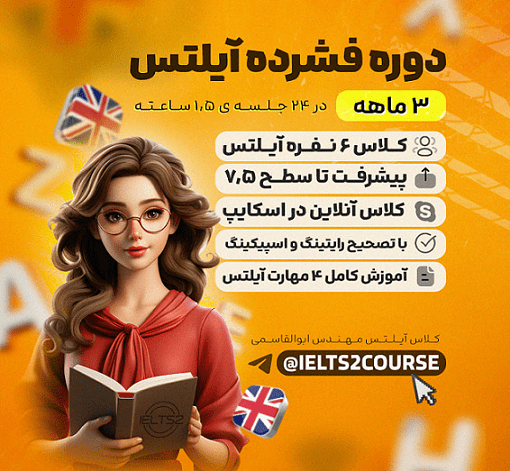نمونه سوالات اسپیکینگ آیلتس درباره فیزیک (پارت 1 2 3)
در این بخش بیش از 20 مورد از نمونه سوالات اسپیکینگ آیلتس نمره 9 درباره “موضوع فیزیک” را با هم میبینیم. این مجموعه از آخرین سوالات گزارش شده از سنترهای برگزار کننده آیلتس در ایران و خارج از کشور مربوط به پارت 1، 2 و 3 می باشند و شانس تکرار آن ها در آینده بالاست. در ادامه مطلب همچنین نکات گرامری، لغات و دلایل دریافت نمره 9 را به طور مشخص توضیح داده ایم تا راهنمایی برای علاقمندان باشد. 1000 نمونه سوالات اسپیکینگ آیلتس با جواب PDF پارت 1 2 3 پیشنهاد بعدی ما به شما عزیزان است.
نمونه سوالات اسپیکینگ آیلتس درباره موضوع فیزیک (پارت 1)
- Did you enjoy studying physics in school?
Absolutely! I found physics fascinating because it explains how the world works, from gravity to electricity. Understanding the laws of motion and energy gave me a new appreciation for everyday phenomena. My teacher made complex concepts engaging through experiments, which made learning even more enjoyable. Although it was challenging at times, I enjoyed solving problems and seeing how theory applied to real life. Physics felt like unlocking the secrets of nature. - Do you think physics is a difficult subject?
Yes, physics can be quite difficult for many people due to its abstract concepts and mathematical nature. It requires strong analytical thinking and problem-solving skills. However, once you grasp the core principles, it becomes much more manageable and even enjoyable. The difficulty also depends on how it’s taught—visual aids, experiments, and practical applications make a huge difference in making it more accessible and engaging. - Did your school have good facilities for learning physics?
Fortunately, yes. My school had a well-equipped physics lab with modern apparatus, which allowed us to perform various experiments. We had access to resources like simulations, projectors, and up-to-date textbooks. These facilities made learning more interactive and enjoyable. Our physics teacher often organized hands-on sessions to help us understand theoretical concepts through practical demonstrations, which enhanced our understanding significantly. - Is physics a popular subject among students in your country?
Not particularly. Many students in my country view physics as one of the more difficult science subjects, often preferring biology or chemistry instead. However, those interested in engineering or space sciences are usually more inclined to study it. I think the lack of interest often stems from how physics is taught—if it were made more relatable and engaging, more students would appreciate its value. - How did your interest in physics start?
My interest in physics began when I watched documentaries about space and black holes. The idea that invisible forces govern the universe intrigued me. I started reading popular science books and experimenting with simple tools at home. This curiosity grew stronger during high school, especially after I realized how physics connects to everything around us, from smartphones to car engines. It felt empowering to understand these concepts. - Do you think physics is useful in everyday life?
Absolutely. Physics is everywhere—from the way our phones function to how cars move. Even something as simple as boiling water involves principles of thermodynamics. Understanding physics helps us make informed decisions, like saving energy or using technology more efficiently. It also fosters logical thinking and problem-solving skills that are valuable in daily situations, whether you’re adjusting the angle of a satellite dish or understanding how a bridge holds weight. - Have you ever used physics knowledge outside the classroom?
Yes, several times. For example, I once fixed a broken ceiling fan using my knowledge of circuits and resistance. I’ve also applied physics when adjusting light angles for photography or even optimizing the trajectory while playing sports. These real-world applications made me realize how useful physics is beyond academics. It’s amazing how much smoother daily tasks become when you understand the principles behind them. - Would you like to pursue a career related to physics?
Yes, I would love to. I’m particularly interested in renewable energy and sustainable technologies. A career in applied physics or engineering would allow me to contribute to solving real-world problems, like reducing carbon emissions or developing clean energy sources. Physics provides a strong foundation for innovation and technological advancement, so pursuing it professionally aligns perfectly with my goals of making a meaningful impact. - Is physics important for future technological development?
Definitely. Physics is the backbone of all technological innovation. Advances in quantum mechanics have led to modern electronics, while classical mechanics underpins engineering and construction. Future technologies like quantum computing and fusion energy depend entirely on physics research. Without a solid understanding of physical laws, we wouldn’t be able to innovate or build new systems. So, physics will continue to play a critical role in shaping the future. - What kind of physics topic do you find most interesting?
I’m particularly fascinated by astrophysics and quantum mechanics. The idea that particles can exist in multiple states or that time behaves differently near a black hole is mind-blowing. These topics challenge our understanding of reality and push the boundaries of what we know. I also find electromagnetism interesting because of its practical applications in technology, from electric motors to wireless communication. These subjects combine imagination and logic, which I find truly exciting.
نمونه سوالات اسپیکینگ آیلتس درباره موضوع فیزیک (پارت 2)
Describe a physics experiment you did at school or saw online. You should say:
What the experiment was
Where and when you did/saw it
What it demonstrated
And explain what you learned from it
Band 9 Answer:
One physics experiment that left a strong impression on me was the classic Newton’s Cradle demonstration. I first saw it in a YouTube science video during high school, and later our teacher replicated it in class. The setup consisted of five metal spheres suspended in a row by strings. When one sphere at the end was lifted and released, it struck the next ball, transferring energy through the stationary ones, causing the ball at the opposite end to swing out with nearly the same speed.
This experiment beautifully demonstrated the laws of conservation of momentum and energy. Watching the transfer of kinetic energy from one ball to another was both mesmerizing and enlightening. It showed how energy can be transferred efficiently in a nearly elastic collision. What amazed me most was the precision of the motion—how only the last ball would swing while the middle ones stayed almost motionless.
Our teacher explained that real-world factors like air resistance and friction eventually stop the motion, but in theory, it could continue indefinitely. This sparked my interest in deeper physical concepts like thermodynamics and system efficiency. I learned how energy transformation works and how important it is in designing machines and understanding physical systems.
What I found particularly valuable about this experiment was its simplicity. With just a few metal balls and strings, we could grasp fundamental laws that govern everything from planetary motion to car crashes. It reminded me that physics doesn’t always need advanced tools; sometimes, the most basic setups can teach the most profound lessons.
Since then, I’ve always looked for real-life situations where I can observe physics in action, whether it’s the arc of a basketball shot or the recoil of a toy gun. The Newton’s Cradle experiment not only helped me understand the science but also ignited a lasting curiosity about how the universe works.
نمونه سوالات اسپیکینگ آیلتس درباره موضوع فیزیک (پارت 3)
- Why is physics considered the foundation of science? Physics is often regarded as the foundation of science because it deals with the fundamental laws that govern all natural phenomena. Whether it’s motion, energy, force, or matter, physics provides the tools and concepts used in chemistry, biology, and even environmental science. For instance, understanding atomic structure is essential in chemistry, and principles like thermodynamics influence biological systems. Without physics, other sciences would lack a solid base for explaining how and why things happen. Its quantitative nature allows for precise predictions, and its theories have practical applications in engineering, medicine, and technology. Because of its wide-ranging relevance, physics forms the backbone of scientific inquiry and innovation across disciplines.
2. How does physics contribute to technological innovation?
Physics is fundamental to technological advancement because it lays the groundwork for understanding how things work. From electricity and magnetism to optics and thermodynamics, innovations like smartphones, medical imaging devices, and space exploration tools all stem from physics. For example, quantum mechanics led to semiconductors, which power computers and electronics. Innovations in nanotechnology and laser systems also depend on physical principles. In short, without physics, modern technology wouldn’t exist. As our knowledge deepens, physics will continue to shape the future of innovation across all fields.
- Should physics education be made compulsory in schools?
I believe it should be, at least up to a certain level. Physics helps develop logical reasoning, analytical thinking, and a deeper understanding of the world. Making it compulsory ensures that students acquire essential problem-solving skills and scientific literacy. Even if they don’t pursue a science career, physics nurtures curiosity and the ability to ask meaningful questions. However, the curriculum should be engaging, using real-life examples and interactive learning to spark interest rather than fear. A strong foundation in physics benefits not just individuals, but society as a whole. - Why do some students struggle with physics?
There are several reasons. Firstly, physics often involves abstract concepts and mathematical calculations, which can be intimidating for students who aren’t confident in math. Secondly, if it’s taught in a purely theoretical way without practical examples, students may fail to see its relevance to real life. Also, poor teaching methods and lack of resources can worsen the situation. To help students, we need more hands-on experiments, visual aids, and real-world applications that make learning interactive and relatable. With the right support, students can overcome their difficulties. - How can physics be taught in a more engaging way?
Teaching physics effectively requires creativity and real-life connections. Teachers can use simulations, experiments, and interactive technology to make lessons more dynamic. For example, showing how physics applies to sports, cooking, or transportation makes it more relatable. Field trips to science museums or engineering labs can inspire curiosity. Group projects and problem-solving activities also encourage collaboration and critical thinking. Ultimately, the goal should be to spark wonder and demonstrate that physics isn’t just equations—it’s the language of the universe in action. - What role does physics play in addressing global challenges?
Physics plays a crucial role in solving many of today’s global problems. For instance, in the fight against climate change, physics helps improve solar panels, wind turbines, and battery technology. In healthcare, it’s essential for medical imaging and radiation treatments. Physics also contributes to cleaner transportation through innovations in electric and hybrid vehicles. Moreover, understanding atmospheric and oceanic physics is key to predicting natural disasters. So, physics is not just academic—it’s a vital tool for building a safer, healthier, and more sustainable world. - Is theoretical physics more important than applied physics?
Both are essential and often interdependent. Theoretical physics explores fundamental laws and helps expand our understanding of the universe—think of Einstein’s theories or quantum mechanics. These discoveries often lead to practical applications later on. Applied physics, on the other hand, focuses on real-world uses of physical principles, like designing medical equipment or developing new materials. While applied physics delivers immediate benefits, theoretical breakthroughs pave the way for future technologies. So, one cannot truly exist without the other, and both contribute significantly to scientific progress. - How has physics changed our understanding of the universe?
Physics has revolutionized our perception of the universe. Classical mechanics explained motion and gravity, while modern physics introduced groundbreaking concepts like relativity and quantum mechanics. These theories reshaped our understanding of time, space, and matter. We now know about black holes, dark matter, and the expanding universe—all thanks to physics. It has taken us from Earth-bound observations to exploring distant galaxies. By continually pushing the boundaries of knowledge, physics helps us grasp our place in the cosmos and the fundamental nature of reality. - Can physics help us predict natural disasters?
Yes, physics is integral in predicting and understanding natural disasters. For example, seismic physics allows scientists to analyze earthquake waves and design early warning systems. Atmospheric physics is crucial in forecasting hurricanes, storms, and climate patterns. Physics-based models simulate potential disaster scenarios and inform emergency responses. The better we understand the forces at play—pressure, energy transfer, and wave behavior—the more accurately we can predict and prepare for such events. So, physics not only explains these phenomena but also helps protect lives. - Should governments invest more in physics research?
Absolutely. Investing in physics research leads to technological innovation, economic growth, and better solutions to global challenges. Breakthroughs in renewable energy, space exploration, and healthcare often begin in physics labs. Government funding ensures long-term research that might not have immediate profits but offers immense societal value. Moreover, supporting physics nurtures talent and fosters scientific literacy. In a rapidly advancing world, nations that invest in physics position themselves at the forefront of innovation and resilience. It’s a strategic and visionary move for any government.
عوامل مؤثر در کسب نمره ۹ در پاسخها
- واژگان پیشرفته و دقیق: استفاده از واژگانی مانند “conservation of momentum,” “quantum mechanics,” و “renewable energy” در پاسخ سوالات اسپیکینگ آیلتس درباره موضوع فیزیک نشاندهنده دایره لغات گسترده و آکادمیک است.
- ساختارهای گرامری متنوع: استفاده از جملات شرطی، مجهول، و جملات ترکیبی مانند “What amazed me most was…” تنوع ساختاری را نشان میدهد.
- روانی و انسجام منطقی: ایدهها با پیوستگی و بهصورت منطقی توسعه یافتهاند. هر پاسخ مقدمه، بدنه و نتیجهگیری دارد.
- پاسخهای شخصی و عمیق: بهجای پاسخهای سطحی، پاسخ سوالات اسپیکینگ آیلتس درباره موضوع فیزیک دیدگاه شخصی، تجربه، یا تحلیل دارد که نمره ارتباط و انسجام را افزایش میدهد.
- دستور زبان صحیح و دقیق: پاسخ سوالات اسپیکینگ آیلتس درباره موضوع فیزیک بدون اشتباهات گرامری و با استفاده از زمانهای مناسب، پاسخها با دقت نگارش شدهاند.
اگر به دنبال آمادگی نمره 9 آیلتس اسپیکینگ درباره موضوعات علمی مثل فیزیک هستید، این نمونه پاسخها نه تنها شما را با ساختار و واژگان مناسب آشنا میکنند، بلکه روش پاسخدهی با اعتماد بهنفس و روان را نیز آموزش میدهند. تمرین با این سؤالات میتواند به طرز چشمگیری نمره شما را در آزمون افزایش دهد.
مطالبی برای مطالعه بیشتر
لغات آیلتس موضوع فیزیک (Physics)
متن انگلیسی درباره دکتر حسابی (با ترجمه فارسی)
سوالات اسپیکینگ درباره علم (نمونه جواب نمره 9)
تعداد کم دانشجویان علاقمند به رشته های علمی (رایتینگ دلیل راه حل)
تعیین سطح رایگان اسپیکینگ ❤️
نمونه سوالات اسپیکینگ آیلتس درباره “موضوع فیزیک” پارت 1 2 3 را به همراه سمپل های نمره 9 آن ها با هم دیدیم. در ادامه نمونه سوالات دسته بندی شده اسپیکینگ آیلتس پیشنهاد آخر ما به دوستان گرامی هست. این نمونه سوالات اسپکینگ از پرتکرار ترین تاپیک های این بخش و همچنین جدیدترین موضوعات می باشند. این مجموعه توسط یکی از سایت های معتبر و فعال آیلتس تنظیم شده است. همچنین برای تعیین سطح و تعیین رایگان نمره اسپیکینگ و دریافت جدید ترین سمپل های نمره 9 در کانال تلگرام اسپیکینگ ما همراه باشید و به ادمین برای تعیین نمره اطلاع دهید.






